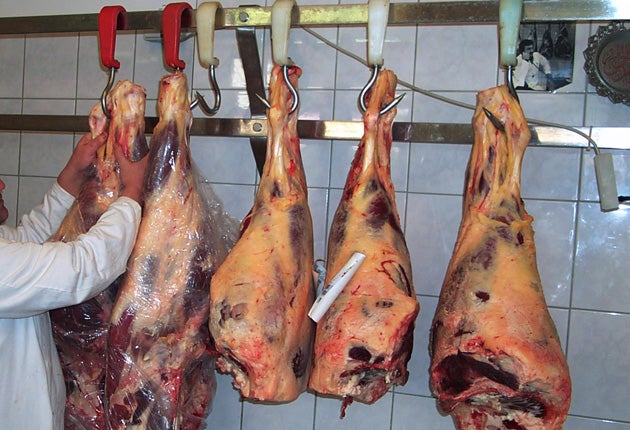New EU rules require compulsory labelling of halal meat

Your support helps us to tell the story
From reproductive rights to climate change to Big Tech, The Independent is on the ground when the story is developing. Whether it's investigating the financials of Elon Musk's pro-Trump PAC or producing our latest documentary, 'The A Word', which shines a light on the American women fighting for reproductive rights, we know how important it is to parse out the facts from the messaging.
At such a critical moment in US history, we need reporters on the ground. Your donation allows us to keep sending journalists to speak to both sides of the story.
The Independent is trusted by Americans across the entire political spectrum. And unlike many other quality news outlets, we choose not to lock Americans out of our reporting and analysis with paywalls. We believe quality journalism should be available to everyone, paid for by those who can afford it.
Your support makes all the difference.Halal and kosher meat will have to be labelled under new European Union rules.
Millions of cows, goats and chickens are slaughtered without stunning each year in the UK under Muslim and Jewish practices, which enjoy an exemption from animal welfare laws.
The RSPCA, other welfare organisations and the Government's veterinary experts say the practice is cruel and should be ended, but another concern is that the meat re-enters the general food chain where it is unwittingly consumed by the general population.
In a series of votes on food labelling this week, which also backed compulsory country-of-origin labelling on all meat, MEPs voted by 559 to 54 for compulsory labelling of the religious slaughter of meat without stunning. While kosher and halal meat is well labelled in specialist butchers and food outlets, the regulation would alert general consumers to supplies entering the mainstream food system.
EU member states will have to approve the legislation and it is likely to return to the European Parliament for a second reading. Once adopted, food business will have three years to adapt to the rules. Smaller operators, with fewer than 100 employees and an annual turnover under €5m (£4.2m), will have five years to comply.
Animal welfare groups welcomed the move. Dr Marc Cooper, a farm animal welfare scientist at the RSPCA, said: "Clear labelling is something we have been calling for, so that the welfare-conscious consumer can be informed about the method of slaughter. From a welfare point of view, it's an unnecessary practice. It causes pain and distress."
The British Veterinary Association (BVA) said: "The BVA believes that all animals should be effectively stunned before slaughter to improve the welfare of these animals at slaughter. However, as long as slaughter without stunning is permitted, the BVA has argued for any meat from this source to be clearly labelled to enable all consumers to fully understand the choice they are making."
Religious slaughter is banned in Switzerland, Sweden, Norway and Iceland. The UK has stopped keeping statistics, but Meat Hygiene Service figures from 2004 suggest that 114 million halal animals and 2.1 million kosher animals are killed annually.
One Muslim organisation, the Halal Food Authority, insists that slaughterhouses stun the animals to render them insensible to pain, but in other halal and almost all kosher slaughterhouses, animals bleed to death without stunning.
Religious groups say that doing so would be against their interpretation of religious texts, and they are exempted from the terms of the Welfare of Animals (Slaughter or Killing) Regulations 1995.
In a report last year, the Farm Animal Welfare Council said chicken and turkeys were likely to be conscious for up to 20 seconds after a transverse incision is made across their neck."Such a large cut will inevitably trigger sensory input to pain centres in the brain," the council said. "Such an injury would result in significant pain and distress before insensibility supervenes."
Professor Bill Reilly, president of the BVA, said: "This is a huge step forward in improving the welfare of animals at slaughter. The more consumers understand these issues, the more consumer power can make a difference."
Halal and kosher
*Each year more than £2bn is spent on Halal meat by British Muslims. The Arabic word means "lawful" or "permitted". The opposite of halal is haram. Meat can only be called Halal if the animal is blessed before it is slaughtered.
*Kosher slaughter is predicated on the principle of "tsa'ar ba'alei chayim" (not causing unnecessary suffering to animals). Historically, the kosher killing technique was one of the more humane methods available.
*Traditional halal meat is killed by hand and must be blessed by the slaughterman. More than 70 per cent of animals whose meat is sold as halal are electrically stunned before they are killed.
*Islam has strict laws on the proper method of slaughtering an animal. One, called dhabihah consists of a swift, deep incision with a sharp knife on the neck that cuts the jugular vein.
*Madonna and Jerry Hall are among celebrities who are reportedly fans of a strict orthodox Jewish diet, while a number of US clinics offer kosher diet therapy.
*KFC is among a growing number of fast-food retailers that have trialled Halal meat in communities where demand is strong. It has 85 stores with an all-halal menu.
*Up to three-quarters of poultry sold as halal in the UK is falsely labelled, a representative from the English Beef and Lamb Executive's halal steering group said. Most is slaughtered by a machine, not an individual.
Join our commenting forum
Join thought-provoking conversations, follow other Independent readers and see their replies
Comments